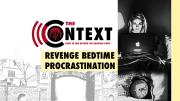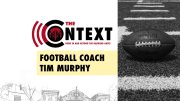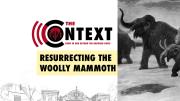This is the fourth post of "The Context"—a biweekly series of archival stories—offering our readers a useful background to some of the most important subjects in the news today. We hope you enjoy it.
Sleep is good, but a lot of people don’t get enough of it. The CDC says about 70 million Americans have chronic sleep problems. Some studies estimate insomnia affects 10 percent to 30 percent of people worldwide; other research pushes those numbers toward 50 percent or even 60 percent.
A number of factors contribute to sleep issues—poor bedtime habits, work, stress, young children. But in a recent column in The Atlantic, Bloomberg professor of the practice of public leadership Arthur C. Brooks focuses on “revenge bedtime procrastination,” in which people delay sleep “as a form of rebellion against their own inner authority.”
Revenge bedtime procrastination seems illogical, insofar as the perpetrator and the recipient of the revenge are the same person. But the explanation is fairly straightforward: It happens when a person harbors some deep resistance to being “told” what to do in an area as personal and fundamental as when to go to bed, likely because she resents being told what to do in other parts of her life. So she fights back by exerting her own authority and staying up.
To fight this tendency, Brooks recommends that people “consciously reason, analyze, and manage” their bedtimes, providing less reason for resistance. And instead of treating sleep as a necessary chore, he thinks it’s beneficial to think of it “as an intrinsic source of wisdom and happiness, which spiritual teachers have done for millennia.”
At Harvard Magazine, we’ve written our fair share of stories on sleep. One of my favorites is former deputy editor Craig Lambert’s feature “Deep Into Sleep,” about U.S. sleep culture and its harmful effects on physical and mental health. “We are living in the middle of history’s greatest experiment in sleep deprivation and we are all a part of that experiment,” professor of psychiatry Robert Stickgold, a cognitive neuroscientist specializing in sleep research, told him. “It’s not inconceivable to me that we will discover that there are major social, economic, and health consequences to that experiment. Sleep deprivation doesn’t have any good side effects.”
Another memorable story of sleep deprivation on campus comes from former Ledecky undergraduate fellow Arianne R. Cohen ’03, who expertly described her decision to forgo sleep during freshman year and the “Great Sleep Epiphany” that knocked her out of that groggy, frazzled, and surprisingly widespread way of life. The article, now almost 20 years old, was one of our most popular stories of that year. “Undergraduates spend the vast majority of their waking hours in a fog so thick they don’t know they’re in it,” Cohen wrote, “holding onto their coffees and Cokes with a death grip, falling asleep all over the campus, making avoidable errors, breaking appointments, and becoming unnecessarily distressed, all because they’re not sleeping enough.” It’s a fun read with some great insights.
For more about sleep in Harvard Magazine’s pages, check out this article on the source of “vivid, bizarre, and colorful” rapid-eye-movement (REM) dreams or this more recent one on the persistence of sleep debt and how the body tracks lost rest. Here’s to a good night’s sleep!
~Jacob Sweet, Associate Editor
More from “The Context”
- Universities Pushed to Reckon with Slavery: Students and activists advocate for institutional change.
- Simpsons Writer John Swartzwelder on Comedy: Sharing some of our best work on comedians and their craft
- Daniel Lieberman on Food Addiction: Framing the news with our best articles on diet and health









